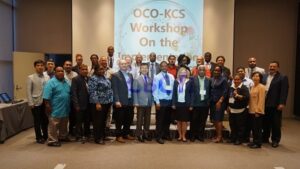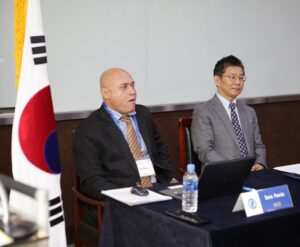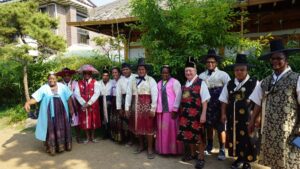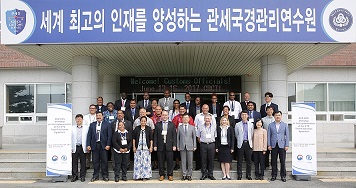 From 12-16 June, 2017, the Oceania Customs Organisation (OCO) in cooperation with Korea Customs Service held a regional Workshop on Implementation of the WTO Trade Facilitation. The Workshop took place at the Customs Border Control Training Institute (CBCTI), Cheon-An, Korea and included participation from twenty four (24) Customs Officials from 13 OCO members (Cook Islands, Federated State of Micronesia, Guam, Kiribati, Marshall Islands, Nauru, Niue, Northern Marianas, Palau, Samoa, Solomon Islands, Tonga, Tuvalu) and 5 Caribbean Customs Administrations (Dominica, Grenada, St Kitss & Nevis, Jamaica, Saint Lucia). The KCS provided funding for the OCO members whilst the World Bank Group supported the participation of the Caribbean countries.
From 12-16 June, 2017, the Oceania Customs Organisation (OCO) in cooperation with Korea Customs Service held a regional Workshop on Implementation of the WTO Trade Facilitation. The Workshop took place at the Customs Border Control Training Institute (CBCTI), Cheon-An, Korea and included participation from twenty four (24) Customs Officials from 13 OCO members (Cook Islands, Federated State of Micronesia, Guam, Kiribati, Marshall Islands, Nauru, Niue, Northern Marianas, Palau, Samoa, Solomon Islands, Tonga, Tuvalu) and 5 Caribbean Customs Administrations (Dominica, Grenada, St Kitss & Nevis, Jamaica, Saint Lucia). The KCS provided funding for the OCO members whilst the World Bank Group supported the participation of the Caribbean countries.
The Workshop was facilitated by experts from the World Customs Organisation, World Bank Group, Korea Customs Service, New Zealand Customs Service and the OCO Secretariat.
The Workshop was the first inter-regional Pacific and Caribbean Workshop intended to facilitate the exchange of views and experience of the two different regions on the implementation of WTO TFA. The Workshop was officially opened by Mr. Sung-man Lim, Director General of CBCTI.
Mr. Seve Paeniu, the Head of Secretariat of the OCO in his welcome remarks reiterated the importance of members implementing TFA provisions in light of the existing regional trade arrangements. He also encouraged participants to maximize the opportunity of learning from the Korea Customs experiences in trade facilitation measures. While encouraging the sharing of experience by the two different regions, he also re-emphasized that there is no one-size fits all model and interventions need to be tailor made to country specificity and capacities. Mr. Paeniu underscored the value of networking and collaborative cooperation between members and development partners to translate the vision of the TFA into reality.
The representative fro m World Bank Group presented the latest development on TFA including the results of the WTO TFA Assessments conducted for 6 WTO and 4 non-WTO Pacific Islands Countries. The WCO representative highlighted the activities of technical assistance and capacity building under the Mercator Programme in assisting Members with the implementation of the TFA by using WCO instruments and tools. The members of the OCO and Caribbean region also presented their current practices and experiences regarding implementation of the TFA. The participants also benefited from the presentations by KCS and NZCS on their experiences on specific TFA provisions vis-à-vis Authorized Economic Operators, Risk Management, Post Clearance Audit, National Trade Facilitation Committee, Coordinated Border Management and Single Window. The participants were informed of the various technical and financial assistance provided by WCO, Word Bank and KCS to support the uniform implementation of the TFA.
m World Bank Group presented the latest development on TFA including the results of the WTO TFA Assessments conducted for 6 WTO and 4 non-WTO Pacific Islands Countries. The WCO representative highlighted the activities of technical assistance and capacity building under the Mercator Programme in assisting Members with the implementation of the TFA by using WCO instruments and tools. The members of the OCO and Caribbean region also presented their current practices and experiences regarding implementation of the TFA. The participants also benefited from the presentations by KCS and NZCS on their experiences on specific TFA provisions vis-à-vis Authorized Economic Operators, Risk Management, Post Clearance Audit, National Trade Facilitation Committee, Coordinated Border Management and Single Window. The participants were informed of the various technical and financial assistance provided by WCO, Word Bank and KCS to support the uniform implementation of the TFA.
Throughout the Workshop, participants discussed capacity needs and highlighted the specific activities in which a regional approach could be undertaken and the sequencing of these activities. The participants were encouraged to undertake necessary step to accession to the Revised Kyoto Convention as a stepping-stone to implementation.
Furthermore, the OCO participants were also encouraged to assess the existing synergies between TFA and Customs provisions in the PACER Plus to ensure a coordinated approach to implementation and to avoid duplication.
The Workshop was successfully concluded with positive feedback from participants on better understanding of the obligations and/or requirements for TFA implementations as well as the opportunities to share good practices, experiences and knowledge on trade facilitation between the two regions.
End.
